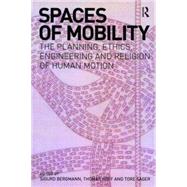Spaces of Mobility: Essays on the Planning, Ethics, Engineering and Religion of Human Motion
, by Bergmann,Sigurd- ISBN: 9781845533403 | 1845533402
- Cover: Nonspecific Binding
- Copyright: 8/8/2014
The imprint of increasing mobility in a globalizing world is so profound that it calls for an analysis far beyond the fora of established academic disciplines. Only a truly inter- and transdisciplinary research approach can do justice to the complexity of problems emerging in the spaces of mobility. The authors of this book have chosen to emphasize mobility not only as a social problem, but to reflect it in a broader sense. The title Spaces of Mobility reflects the insight that nearly all modern and late modern systems for the movement of people and goods are technically constructed and that they create spaces and places with specific qualities. Given this perspective, it is meaningful to emphasize both the social (including the economic and political) implications of mobility and the ideologies and practices that influence the design, production and distribution of artefacts for mobility. And because mobilities, i.e. different modes of technically aided movement, are products of human beings, this means that the human dimension of mobility also needs to be mined deeper. Mobilities never occur in an empty space, but human moveability and motion are always a part of our natural and built environments. Along with the sociological and human dimensions of mobility, its spatial, environmental dimension also must be taken seriously. The contributions of this volume do not offer one single theory or methodology for transdisciplinary mobility studies, but are instead meant to promote the development of overarching approaches in the future. The aesthetic aspects of perception are interwoven with ethical aspects of producing normative criteria for evaluating motion in space; psychological aspects of interacting with others in complex surroundings are interconnected with the social belongings of human beings in transit; political aspects of the future of democracy and participatory planning are dependent on the design and construction of technical artefacts and spaces.






